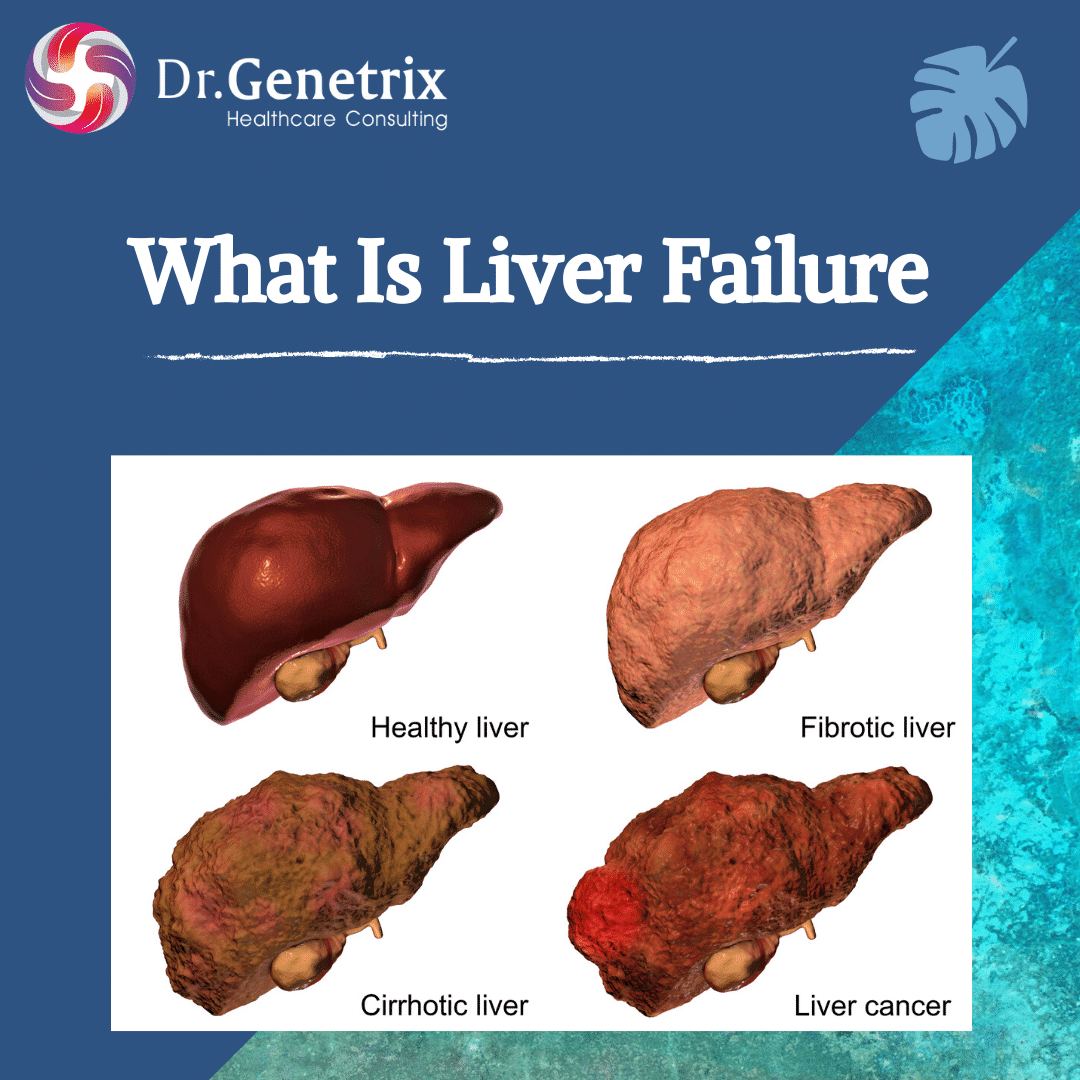An overview of Liver Failure
What is Liver Failure?
Liver failure occurs when your liver isn’t working well enough to perform its functions (for example, manufacturing bile and ridding your body of harmful substances). Symptoms include nausea, loss of appetite, and blood in the stool. Treatments include avoiding alcohol and avoiding certain foods.

Causes of Liver Failure
Many different diseases and conditions cause liver failure, including Hepatitis B and C, non-alcohol related fatty liver disease, alcohol abuse and hemochromatosis.
In many cases, chronic liver failure results from cirrhosis. Cirrhosis is the scarring of your liver from repeated or long-lasting injury, such as from drinking alcohol excessively over a long period of time or chronic hepatitis infection. As scar tissue replaces healthy liver tissue, your liver loses its ability to function.
Acute liver failure is most often caused by:
1. Viral infections, such as Hepatitis B.
2. The overuse of certain drugs or toxins, like acetaminophen (Tylenol®), and the use of other medications (including certain antibiotics, antidepressants, anti-seizure medications, man-made hormones and antifungal drugs) and herbs (green tea extract and kava).
3. Metabolic (biologic) or vascular (vessels that carry fluids, such as arteries) disorders, such as Wilson disease and autoimmune hepatitis.
Signs and symptoms of Liver Failure
Liver failure can take years to develop. The symptoms of liver failure often look like symptoms of other medical conditions, which can make it hard to diagnose in its early stages. Symptoms get worse as your failing liver continues to get weaker.
Chronic liver failure, or liver failure that occurs over many years, may cause:
1. Fatigue
2. Nausea
3. Loss of appetite
4. Diarrhea
5. Vomiting blood
6. Blood in the stool
As liver failure advances, symptoms become more severe. In later stages, symptoms of liver failure may include:
1. Jaundice (yellowing of your skin and eyes).
2. Extreme tiredness.
3. Disorientation (confusion and uncertainty).
4. Fluid buildup in your abdomen and extremities (arms and legs).
Sometimes, your liver fails suddenly, which is known as acute liver failure. People with acute liver failure may have the following symptoms:
1. Bleeding.
2. Changes in mental status.
3. Musty or sweet breath odor.
4. Movement problems.
5. Loss of appetite.
6. General feeling of being unwell.
7. Jaundice.
Preventive measures against Liver Failure
You can reduce your chances of developing liver failure by:
1. Being vaccinated for hepatitis B.
2. Cutting down on alcohol consumption.
3. Maintaining a weight that's healthy for you and active lifestyle
4. Following directions when using medications like acetaminophen (Tylenol®).
5. Having a physical examination every year (at least) with a primary care provider, with screening for obesity, high cholesterol, high blood pressure and diabetes.
How Is Liver Failure Diagnosed?
The doctor diagnoses liver failure based on your symptoms, your medical history and the results of tests (blood tests, urine tests, abdominal imaging).
Treatment for Liver Failure
Liver disease and liver failure are usually treated by specialists called hepatologists.
Treatment of liver failure depends on whether it is acute or chronic. For chronic liver failure, treatment includes changes to your diet and lifestyle, including:
1. Avoiding alcohol or medications that can harm your liver.
2. Eating less of certain foods, including red meat, cheese and eggs.
3. Weight loss and management of metabolic risk factors, including high blood pressure and diabetes.
4. Cutting down on salt in your diet (including not adding salt to food).
For acute (sudden) liver failure, treatment includes:
1. Intravenous (IV) fluids to maintain blood pressure.
2. Medications such as laxatives or enemas to help flush toxins (poisons) out.
3. Blood glucose (sugar) monitoring. Your provider will give you glucose if your blood sugar drops.
You may also receive a blood transfusion if you are bleeding excessively, or a breathing tube to help you breathe.
In both acute and chronic liver failure, your doctor may recommend a liver transplant. Before transplantation, doctors thoroughly screen transplant candidates to make sure a new organ might help them before placing them on organ waiting lists.
During the transplantation surgery, a healthy liver from a living or deceased donor replaces a damaged or diseased liver. Some transplant centers are able to replace a damaged liver with a portion of a healthy liver because the liver can regenerate, or grow back.
Complications
Liver failure can affect many of your body’s organs. Acute liver failure can cause such complications as infection, electrolyte deficiencies and bleeding. Without treatment, both acute and chronic liver failure may eventually result in death.
Frequently Asked Questions About Liver Failure
Contact your doctor or go to the emergency department immediately if you develop any symptoms of liver failure.
Many people recover from liver failure with treatment. If a transplant is necessary, most patients go back to their daily activities within six months. People who have received a transplant need lifelong medical care, including medications to prevent their body from rejecting the new organ.
In the U.S., approximately 30 million people have some form of liver disease. More than 8,000 people in the U.S. received liver transplants in 2017, and more than 17,000 people are on the waiting list for a liver transplant.
Liver failure occurs when your liver isn’t working well enough to perform these tasks. Liver failure can be a life-threatening emergency that requires immediate medical attention.